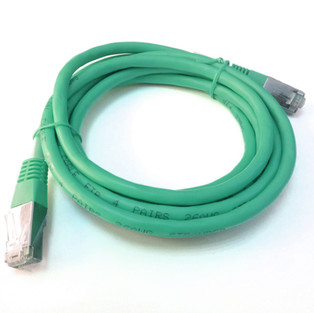Do you need a IP or Analog Security system?
- GABO ENTERPRISES

- Dec 9, 2019
- 4 min read
Updated: May 16, 2020
Finally, everything drills down to the requirement of the individual. But it should be an educated choice, based on multiple factors like technology, budget, and installation. It would be better to know what is what, before choosing what you want. Leaving out all the other factors, this blog is dedicated to differentiate between a IP Security System and Analog Security System.

Touch up the basics
Before diving deep, let us freeze for few snaps about the technologies we are about to discuss. IP camera, commonly called Network camera is a sophisticated and modern product that throws up an array of options to play around with. Analog cameras are a long dismantled technology and hence it would be redundant to get a lesson of it. The subject of discussion would rather be HD over Analog cameras, referred as Analog HD Cameras. AHD, HD-CVI and HD-TVI Technology based cameras fall under the category of Analog HD Cameras. Analog HD Camera is the traditional technology that disrupted the surveillance industry with HD clarity first. To understand how both these technologies differ in their operations, it is necessary to understand how they work.
Analog HD Cameras transmit video and audio signals in analog format, which is then converted to Digital signals by the DVR (Digital Video Recorder). This digitisation process enables the video and audio signals to be stored as data in hard disks and also consumed via display units like TV. The medium of transmission is usually coaxial cabling and hence it is usually a one way communication. This limits the opportunity to perform any strategic and logical operations at the camera end. IP cameras on the other hand transmit signal by twisted pair network cables, coax cables or even through wireless transmission. The transmission mode is digital and hence there are a lot of logical decision making and operational possibilities at the camera end itself. A short list up of comparative features would make things simpler#AnalogVsIP
List them down:
Resolution and Video Quality:
Analog HD Cameras operate from 1 Mega pixel to 5 Mega Pixel range. In most economical requirements, a 1.3 MP or 2 MP camera would suffice for a clear image quality.
IP Cameras, offer qualities from 1 MP to 12 MP. With a pixel density easily above 1080p IP cameras offer the better range of clarity. On comparison, IP cameras with the same mega pixel range as Analog offers much more detail and clarity than an Analog HD Camera. Zooming into a image from Analog cameras would get distorted easily, whereas that of IP cameras are more clear. Features like Face detection and License plate recognition are hence possible with IP cameras.

Transmission or cabling Options:
Analog HD Cameras use a coaxial RG 59 cable for signal transmission and lately twisted pair cabling is also used for transmission. Camera to DVR wiring, can be laid upto 300 meters with coax cabling and upto 15 kilometres with twisted pair cabling. But longer the distance, the more losses seen in the image clarity and resolution.
IP Cameras can transmit data through twisted pair cabling, fibre optic cabling or wireless transmission. Data can be carried from a camera to a NVR, that is even 20 Kilometres far with proper cabling. Also the loss in data signal is very negligible when compared to Analog signals.
Options to Power up cameras:
A huge advantage of IP camera over analog version is the availability of PoE or Power Over Ethernet option, that enables running the power and data within a single cabe. Drastically reducing the cabling complexity and pricing involved, PoE also gives an easy expansion option for adding more cameras into the setup. Analog cameras need a separate power line to run along the video coax line. It can have a integrated 3+1 cable with video and power lines within a single sleeve, but still in the core the power can’t run along for longer distances without loss. PoE on the other hand is equipped with options to intelligently manage associated camera power requirements based on the cabling lengths.

Intelligence and Security:
IP technology is synonymous with network and management. Add on intelligence and logical decisioning, it is called edge computing. This computing feature in integrated into the IP cameras, which enables them to take predefined actions at the camera end itself, before sending data and signals to the NVR. With Edge computing, IP cameras are intelligent, programmable and manageable. Analog signal transmission is a one way communication and hence it is becomes impossible to add intelligence and communicable decision making.
Analog signals can be physically interpreted and tampered with, along the cabling path. All the compression and encryption happens at the DVR end and hence it resides as a one point storage and execution. Hence a security breach is more likely and possible. IP Cameras on the other hand ensure that a proper encryption-decryption is in place between the camera and NVR. Same goes well for their data compression mechanisation as well. With a proper data backup plan, IP Cameras can be the best reliable option as it can get.
Costing:
Analog HD cameras are far more cheaper and is the easiest option available to upgrade from any existing analog traditional security setup. Cabling for Analog HD cameras can get expensive because of two reason.One to one cable mapping necessary between any camera and the DVR and then the exclusive power cabling required.
IP cameras as such are expensive than their Analog counterparts. However taking into account the cost saved in the ethernet cabling, the overall expenditure might be only a notch higher than the Analog setup. It should be also drilled down to the features required for any particular location.
Choose Wisely:

Wireless communication setup, Face Detection, License Plate Recognition (ANPR), Motion detection based Alarm, Scenario based lighting are few features that are possible only with IP Cameras. On the same way, an upgrade from an existing analog setup or the most economical option in offer would be a Analog HD Security system.So the choice of the security system should amicably be decided, based upon the features required for that particular scenario, the budget allocated and possibility of wiring.










Comments